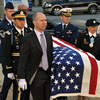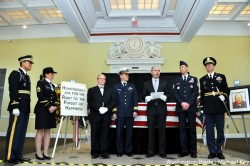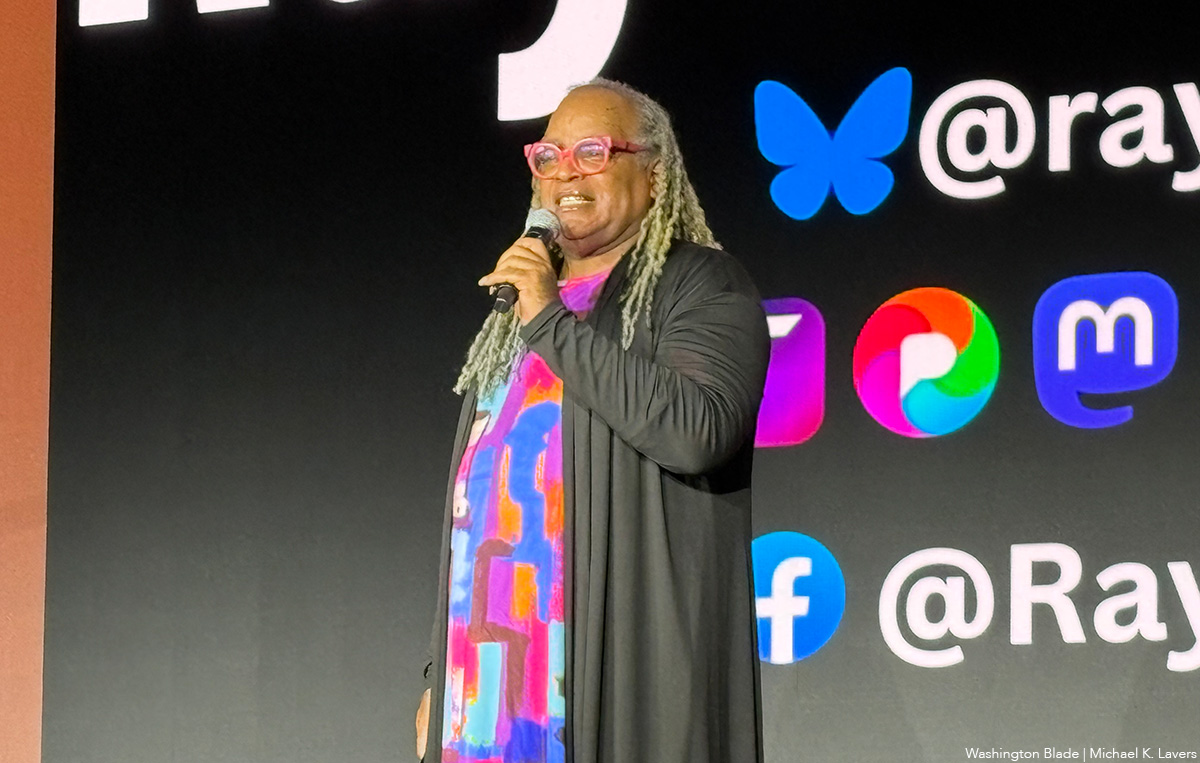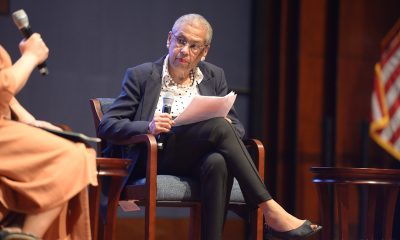Local
Kameny’s death is local LGBT story of the year
Activists, public officials mourn loss of pioneering figure


Activist Frank Kameny died on Oct. 11, which is National Coming Out Day. (Washington Blade file photo by Michael Key)
Local and national public officials joined D.C.’s LGBT community in remembering the life and accomplishments of veteran gay rights leader Frank Kameny at memorial events this fall following Kameny’s death in Washington on Oct. 11.
Kameny, 86, is credited with being one of the leading strategists for the early gay rights movement beginning at least a decade before the 1969 Stonewall Riots in New York’s Greenwich Village, which historians consider the starting point for the modern LGBT rights movement.
LGBT movement leaders who knew Kameny say he laid the groundwork for the movement to advance following the Stonewall Riots and going forward, playing a pivotal role in advancing the cause of LGBT equality over a period of 50 years.
“Frank Kameny is one of the most significant figures in the history of the American gay rights movement,” said D.C. Mayor Vincent Gray at a Nov. 3 memorial viewing for Kameny at the city’s Carnegie Library building.
Gray was joined at the memorial viewing by several members of the D.C. City Council, including gay Council members David Catania (I-At-Large) and Jim Graham (D-Ward 1); D.C. Police Chief Cathy Lanier and D.C. Congressional Delegate Eleanor Holmes Norton (D).
A gay Air Force sergeant and four gay military veterans in full dress uniform, including gay former Army Lt. Dan Choi, joined Catania and Graham as pallbearers, carrying an American flag-draped coffin bearing Kameny’s remains into the building’s ceremonial atrium.
Organizers of the ceremony, led by local activists and Kameny friends Bob Witeck and Charles Frances, said the flag-draped coffin honored Kameny, among other things, for his service in the Army in World War II, where he served in combat in Europe.
Among other accomplishments, activists said Kameny became the first known gay person to publicly challenge an act of anti-gay discrimination when he sued the federal government for firing him from his job in 1957 as a civilian astronomer with the U.S. Army Map Service because of his sexual orientation.
After losing his case in the lower courts, Kameny set yet another precedent by bringing the first known gay-related case before the U.S. Supreme Court. The high court upheld a lower court ruling against Kameny and refused to take his case on the merits.
But in a 61-page legal brief petitioning the court to take the case, which Kameny wrote, he pulled together what some gay historians consider a gay rights manifesto that became the underpinning of the LGBT rights movement for years to come.
In a second memorial for Kameny held Nov. 15 at the Cannon House Office Building on Capitol Hill, several public officials, including members of Congress and an Obama administration official, cited Kameny’s role as a national civil rights figure.
“His life cleared the path that I and countless others followed into public service,” said John Berry, director of the U.S. Office of Personnel Management, who in 2009 became the Obama administration’s highest-level openly gay appointee.
“His unrelenting and unceasing fight for gay rights enabled other Americans to step out of the closet and into the full light of equality,” Berry told the gathering. “But most importantly, his long battle and eventual triumphs show the miracles that one person wrought upon the world.”
Kameny’s friends and colleagues said they were saddened over his passing but uplifted in knowing that Kameny lived to see many of the LGBT rights initiatives he fought for come to fruition, including an apology by the government, more than 50 years later, for its decision to fire him.
Kameny also lived to see the Library of Congress acquire more than 50,000 documents from his gay rights-related papers collection; the Smithsonian Institution’s American History Museum acquire and display picket signs he and his fellow activists carried in gay rights protests in the 1960s; the D.C. government’s naming a section of 17th Street, N.W., near Dupont Circle as Frank Kameny Way; and a decision by city officials to designate Kameny’s house as an historic landmark.
Arrangements are being made for a burial service for Kameny’s ashes at D.C.’s historic Congressional Cemetery in the spring.
Virginia
McPike wins special election for Va. House of Delegates
Gay Alexandria City Council member becomes 8th LGBTQ member of legislature

Gay Alexandria City Council member Kirk McPike emerged as the decisive winner in a Feb. 10 special election for a seat in the Virginia House of Delegates representing Alexandria.
McPike, a Democrat, received 81.5 percent of the vote in his race against Republican Mason Butler, according to the local publication ALX Now.
He first won election to the Alexandria Council in 2021. He will be filling the House of Delegates seat being vacated by Del. Elizabeth Bennett-Parker (D-Alexandria), who won in another Feb. 10 special election for the Virginia State Senate seat being vacated by gay Sen. Adam Ebbin (D-Alexandria).
Ebbin is resigning from his Senate next week to take a position with Virginia Gov. Abigail Spanberger’s administration.
Upon taking his 5th District seat in the House of Delegate, McPike will become the eighth out LGBTQ member of the Virginia General Assembly. Among those he will be joining is Sen. Danica Roem (D-Manassas), who became the Virginia Legislature’s first transgender member when she won election to the House of Delegates in 2017 before being elected to the Senate in 2023.
“I look forward to continuing to work to address our housing crisis, the challenge of climate change, and the damaging impacts of the Trump administration on the immigrant families, LGBTQ+ Virginians, and federal employees who call Alexandria home,” McPike said in a statement after winning the Democratic nomination for the seat in a special primary held on Jan. 20.
McPike, a longtime LGBTQ rights advocate, has served for the past 13 years as chief of staff for gay U.S. Rep. Mark Takano (D-Calif.) and has remained in that position during his tenure on the Alexandria Council. He said he will resign from that position before taking office in the House of Delegates.
Local
Local LGBTQ groups, activists to commemorate Black History Month
Rayceen Pendarvis to moderate Dupont Underground panel on Sunday

LGBTQ groups in D.C. and elsewhere plan to use Black History Month as an opportunity to commemorate and celebrate Black lives and experiences.
Team Rayceen Productions has no specific events planned, but co-founder Rayceen Pendarvis will attend many functions around D.C. this month.
Pendarvis, a longtime voice in the LGBTQ community in D.C. moderated a panel at Dupont Underground on Feb. 8. The event, “Every (Body) Wants to Be a Showgirl,” will feature art from Black burlesque artists from around the country. Pendarvis on Feb. 23 will attend the showing of multimedia play at the Lincoln Theatre that commemorates the life of James Baldwin.
Equality Virginia plans to prioritize Black voices through a weekly online series, and community-based story telling. The online digital series will center Black LGBTQ voices, specifically trailblazers and activists, and contemporary Black queer and transgender people.
Narissa Rahaman, Equality Virginia’s executive director, stressed the importance of the Black queer community to the overall Pride movement, and said “Equality Virginia is proud to center those voices in our work this month and beyond.”
The Capital Pride Alliance, which hosts Pride events in D.C., has an alliance with the Center for Black Equity, which brings Black Pride to D.C. over Memorial Day weekend. The National LGBTQ Task Force has no specific Black History Month events planned, but plans to participate in online collaborations.
Cathy Renna, the Task Force’s director of communications, told the Washington Blade the organization remains committed to uplifting Black voices. “Our priority is keeping this at the forefront everyday,” she said.
The D.C. LGBTQ+ Community Center is also hosting a series of Black History Month events.
The D.C. Public Library earlier this year launched “Freedom and Resistance,” an exhibition that celebrates Black History Month and Martin Luther King Jr. It will remain on display until the middle of March at the Martin Luther King Jr. Memorial Library at 901 G St., N.W.
District of Columbia
U.S. Attorney’s Office drops hate crime charge in anti-gay assault
Case remains under investigation and ‘further charges’ could come

D.C. police announced on Feb. 9 that they had arrested two days earlier on Feb. 7 a Germantown, Md., man on a charge of simple assault with a hate crime designation after the man allegedly assaulted a gay man at 14th and Q Streets, N.W., while using “homophobic slurs.”
But D.C. Superior Court records show that prosecutors with the Office of the U.S. Attorney for D.C., which prosecutes D.C. violent crime cases, charged the arrested man only with simple assault without a hate crime designation.
In response to a request by the Washington Blade for the reason why the hate crime designation was dropped, a spokesperson for the U.S. Attorney’s office provided this response: “We continue to investigate this matter and make no mistake: should the evidence call for further charges, we will not hesitate to charge them.”
In a statement announcing the arrest in this case, D.C. police stated, “On Saturday, February 7, 2026, at approximately 7:45 p.m. the victim and suspect were in the 1500 block of 14th Street, Northwest. The suspect requested a ‘high five’ from the victim. The victim declined and continued walking,” the statement says.
“The suspect assaulted the victim and used homophobic slurs,” the police statement continues. “The suspect was apprehended by responding officers.”
It adds that 26-year-old Dean Edmundson of Germantown, Md. “was arrested and charged with Simple Assault (Hate/Bias).” The statement also adds, “A designation as a hate crime by MPD does not mean that prosecutors will prosecute it as a hate crime.”
Under D.C.’s Bias Related Crime Act of 1989, penalties for crimes motivated by prejudice against individuals based on race, religion, sexual orientation, gender identity, disability, and homelessness can be enhanced by a court upon conviction by one and a half times greater than the penalty of the underlying crime.
Prosecutors in the past both in D.C. and other states have said they sometimes decide not to include a hate crime designation in assault cases if they don’t think the evidence is sufficient to obtain a conviction by a jury. In some instances, prosecutors have said they were concerned that a skeptical jury might decide to find a defendant not guilty of the underlying assault charge if they did not believe a motive of hate was involved.
A more detailed arrest affidavit filed by D.C. police in Superior Court appears to support the charge of a hate crime designation.
“The victim stated that they refused to High-Five Defendant Edmondson, which, upon that happening, Defendant Edmondson started walking behind both the victim and witness, calling the victim, “bald, ugly, and gay,” the arrest affidavit states.
“The victim stated that upon being called that, Defendant Edmundson pushed the victim with both hands, shoving them, causing the victim to feel the force of the push,” the affidavit continues. “The victim stated that they felt offended and that they were also gay,” it says.
-

 Virginia2 days ago
Virginia2 days agoMcPike wins special election for Va. House of Delegates
-

 New York4 days ago
New York4 days agoPride flag removed from Stonewall Monument as Trump targets LGBTQ landmarks
-

 Florida4 days ago
Florida4 days agoDisney’s Gay Days ‘has not been canceled’ despite political challenges
-

 Philippines4 days ago
Philippines4 days agoPhilippines Supreme Court rules same-sex couples can co-own property





















